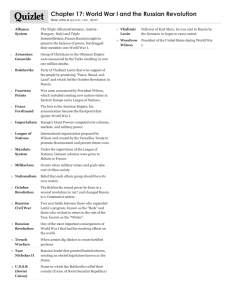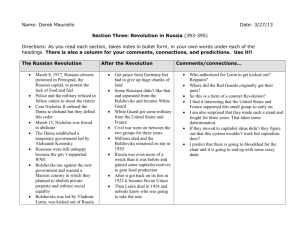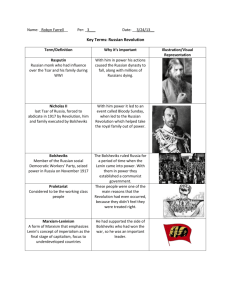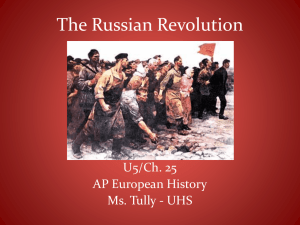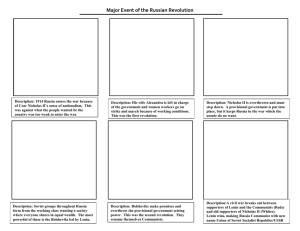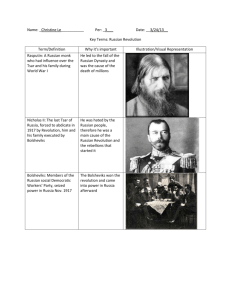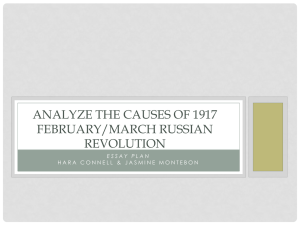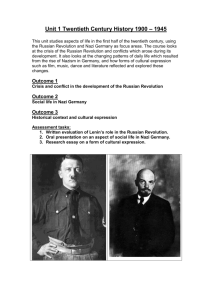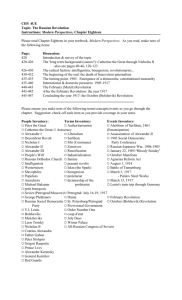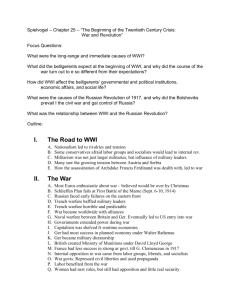Print › World War I& the Russian Revolution | Quizlet | Quizlet
advertisement
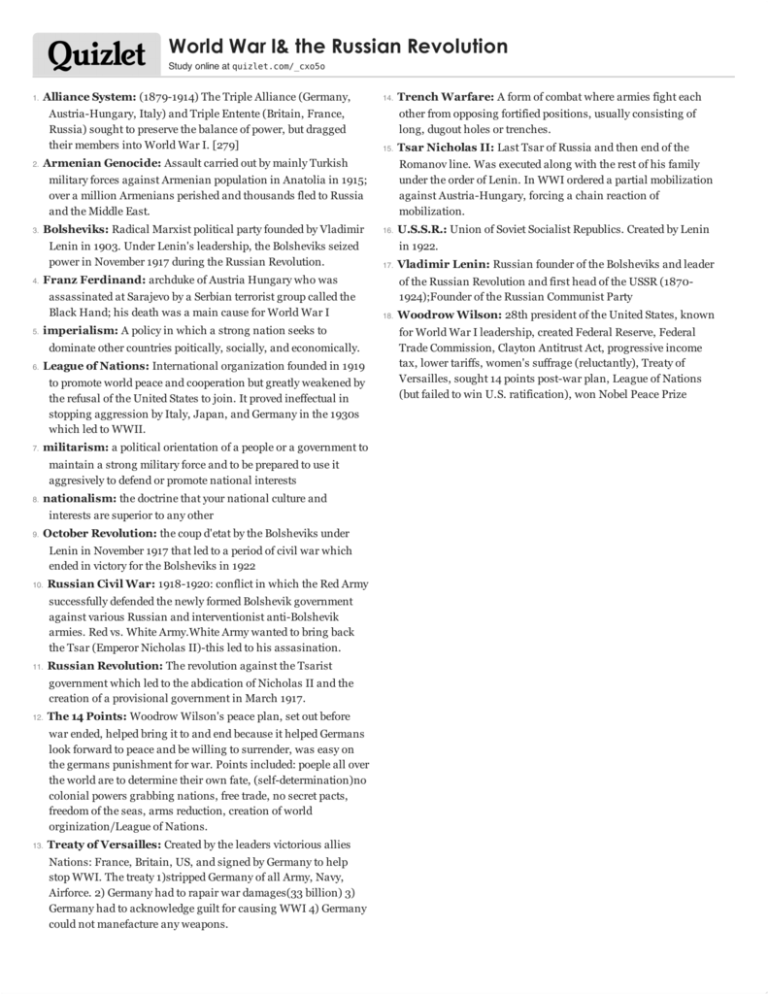
World War I& the Russian Revolution Study online at quizlet.com/_cxo5o 1. Alliance System: (1879-1914) The Triple Alliance (Germany, Austria-Hungary, Italy) and Triple Entente (Britain, France, Russia) sought to preserve the balance of power, but dragged their members into World War I. [279] 2. 14. other from opposing fortified positions, usually consisting of long, dugout holes or trenches. 15. Armenian Genocide: Assault carried out by mainly Turkish Bolsheviks: Radical Marxist political party founded by Vladimir Lenin in 1903. Under Lenin's leadership, the Bolsheviks seized power in November 1917 during the Russian Revolution. 4. 5. imperialism: A policy in which a strong nation seeks to dominate other countries poitically, socially, and economically. 6. League of Nations: International organization founded in 1919 to promote world peace and cooperation but greatly weakened by the refusal of the United States to join. It proved ineffectual in stopping aggression by Italy, Japan, and Germany in the 1930s which led to WWII. 7. militarism: a political orientation of a people or a government to maintain a strong military force and to be prepared to use it aggresively to defend or promote national interests 8. nationalism: the doctrine that your national culture and interests are superior to any other 9. 16. October Revolution: the coup d'etat by the Bolsheviks under Lenin in November 1917 that led to a period of civil war which ended in victory for the Bolsheviks in 1922 10. Russian Civil War: 1918-1920: conflict in which the Red Army successfully defended the newly formed Bolshevik government against various Russian and interventionist anti-Bolshevik armies. Red vs. White Army.White Army wanted to bring back the Tsar (Emperor Nicholas II)-this led to his assasination. 11. Russian Revolution: The revolution against the Tsarist government which led to the abdication of Nicholas II and the creation of a provisional government in March 1917. 12. The 14 Points: Woodrow Wilson's peace plan, set out before war ended, helped bring it to and end because it helped Germans look forward to peace and be willing to surrender, was easy on the germans punishment for war. Points included: poeple all over the world are to determine their own fate, (self-determination)no colonial powers grabbing nations, free trade, no secret pacts, freedom of the seas, arms reduction, creation of world orginization/League of Nations. 13. Treaty of Versailles: Created by the leaders victorious allies Nations: France, Britain, US, and signed by Germany to help stop WWI. The treaty 1)stripped Germany of all Army, Navy, Airforce. 2) Germany had to rapair war damages(33 billion) 3) Germany had to acknowledge guilt for causing WWI 4) Germany could not manefacture any weapons. U.S.S.R.: Union of Soviet Socialist Republics. Created by Lenin in 1922. 17. Franz Ferdinand: archduke of Austria Hungary who was assassinated at Sarajevo by a Serbian terrorist group called the Black Hand; his death was a main cause for World War I Tsar Nicholas II: Last Tsar of Russia and then end of the Romanov line. Was executed along with the rest of his family under the order of Lenin. In WWI ordered a partial mobilization against Austria-Hungary, forcing a chain reaction of mobilization. military forces against Armenian population in Anatolia in 1915; over a million Armenians perished and thousands fled to Russia and the Middle East. 3. Trench Warfare: A form of combat where armies fight each Vladimir Lenin: Russian founder of the Bolsheviks and leader of the Russian Revolution and first head of the USSR (18701924);Founder of the Russian Communist Party 18. Woodrow Wilson: 28th president of the United States, known for World War I leadership, created Federal Reserve, Federal Trade Commission, Clayton Antitrust Act, progressive income tax, lower tariffs, women's suffrage (reluctantly), Treaty of Versailles, sought 14 points post-war plan, League of Nations (but failed to win U.S. ratification), won Nobel Peace Prize

